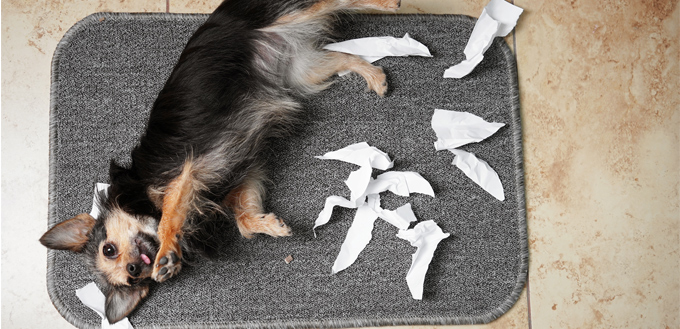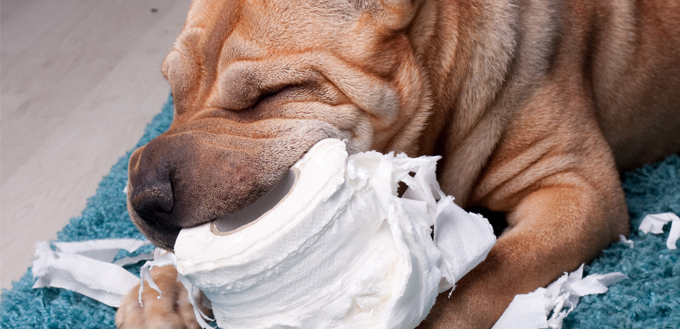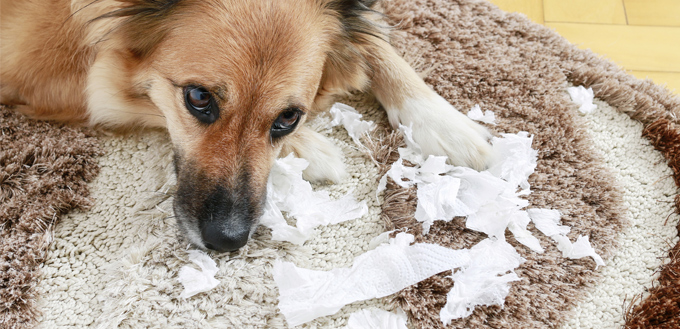When your pet starts acting out, it can be confusing, amusing, or downright worrying. In some cases, the sudden change in dog behavior can mean something serious is at play. Of course, there are many things can affect a dog’s behavior but, when it’s something tangible like finding your pet eating paper, it can be good to know that at least there is solid reasoning behind it and there is even some definitive action you can take.
So, if you’re wondering why your dog is eating used tissues or finding yourself picking up strange colored poop out of your garden, read on and discover what’s going on, what can be done and how serious the matter really is.

Why is My Dog Eating Paper all of a Sudden?
Strange behavior can happen from time-to-time in dogs- just look at the zoomies, for example. Running around the house at high speed for no other reason than to burn off some energy can be completely abnormal for us- and totally normal for dogs. There are, however, other instances which are known for being abnormal in both people and our canine companion. One such instance of this is the sudden desire to start eating non-edible things.
This is more common than you’d actually think- although still not so common that it would be considered atypical. It’s called Pica, and it comes about for a variety of reasons- and it doesn’t just have to be paper. If your dog is suddenly eating wood, or likes to hunt down sanitary towels for a snack, it all comes under the same branch- it’s all due to suffering from Pica.
What is Pica?
Pica is a condition where the sufferer desires to eat non-food items. You may find that your dog specifically likes one item, consistently, such as paper, which is one of the most common non-food items wanted by sufferers of Pica. But they can also like varied items, all of which aren’t considered food but are eaten by your dog.
You may have heard of Pica if you know of someone who has been pregnant or have been through pregnancy yourself- essentially all that hard work your body goes through demands extra nutrients and, sometimes, your brain can confuse the edible source of that nutrient with something that is a non-food item. The same thing happens with dogs- in that the main cause of the issue, is the desire to fulfil a nutritional need, that the brain misrepresents as a desire to eat toilet paper.
The problem with Pica is that, because it is a behavior and therefore can’t be traced using bloodwork or similar tests, it is very difficult to diagnose. That’s why, if you think your dog may be suffering from Pica, it can be a good idea to try and catch your dog’s unusual interest on camera, so that you can show you vet some behavior before and after the paper-eating incident, too.
Related Post: Best Dog Camera
Luckily, the underlying reasons can sometimes be discovered through thorough testing, once diagnosed. Therefore, if there are any hormonal imbalances or nutritional deficiencies, these can show up through bloodwork, urine samples, stool samples or a range of other tests. These will show if there is an issue with the absorption of certain foodstuffs too, which can sometimes cause Pica. Naturally, the treatment can then be easily administered through a change in diet, or with supplements to maintain a healthy balance of vitamins and minerals.
It should not be confused with coprophagia- a condition in which the dog may feel the need to eat faeces. This is a common habit in puppies which, if not trained out of, can carry on into adulthood. The reasons for coprophagia are unknown but educated guesses include everything from how it smells to how it tastes. Put simply, some dogs just like it!
Side Effects of Dog Eating Paper
While the side effects for you might be pretty obvious- lack of paper, frustration and desperately searching for loo roll while on the toilet- for dog’s the side effects can be much more serious, requiring intervention and- in serious cases- surgery. Some of these side effects include:
- Sour stomach
Essentially, this is a mild case of food sickness or diarrhea, involving runny stools, lethargy, dehydration, vomiting and generally feeling very sorry for themselves.
- Constipation
Going the other way, a dog who is constipated may show signs such as whimpering or yelping while trying to go to the toilet, frequently asking to go outside but not being able to go to the toilet, being sick and being lethargic.
- Blockage
Much more severe is a complete blockage of your dog’s digestive system. This can happen anywhere along the digestive tract and requires IMMEDIATE surgery. The most common areas this is likely to happen include the stomach and the intestines and can be extremely painful for your dog. Symptoms are likely to show almost immediately, and your dog’s health will decline rapidly if this is happening. They will usually include a lack of appetite, extreme sensitivity around the stomach area, weight loss, or bloating. If you think that your dog is suffering from a blockage, do not hesitate to call your vet.

How to Stop Your Dog Eating Paper
There are two main methods of treatment when it comes to dogs eating non-food items. The first, which we’ve already discussed, include checking for any abnormalities in the digestive system or within their diet. These include malabsorption of food (so your pooch may be eating the right stuff but it’s not getting into his or her system and fulfilling that nutritional need), missing vitamins or nutrients, or hormonal imbalances.
For all of these issues, a few tests will need to be carried out. If something shows up as abnormal, the right diet can be recommended, or medication prescribed. If you dog requires medication, it is likely that they’ll need to stay on this for the rest of their life. However, in some instances, the problem might be temporary and can be resolved over time.
In terms of changing your pup’s diet, there are a few options available which can make a huge difference. One of these is to add an enzyme to your pup’s food, which will help them break down a specific part of their food and allow their body to absorb this as normal. Adding extra antioxidant-rich food can also have a huge impact and is usually recommended by vets while waiting for your test results. Examples of this include cranberries, which are usually easily available in dog treat format and can be very healthy for your dog to take anyway.
It’s also advised that big bowls of food are swapped out for smaller, more frequent meals throughout the day. While this can be inconvenient for those who work through the day, it can 100% be worth the extra trip home, since the spaced-out meals allow your doggies digestive system to really crack on with getting into each meal, which means they’re more likely to be fully digested. If you can’t get away from work, have a chat with a friend, neighbor or relative and see if they’d be willing to help you- it can save you on costly vet bills, if you aren’t sure on the cause and gives your vet a head-start if you do need to speak to them since many vets prefer to find a non-medicinal solution over a medical prescription.
Related Post: Best Dog Bowls
Of course, if it turns out that your dog is actually suffering from separation anxiety, then there are also a range of options available. The first of which is to begin crate training, and general training, so that your pup grows more comfortable in their own company and understands that you aren’t abandoning them. Training your dog helps them to realize that you are coming home and that they don’t need to be worried, while crate training gives them a secure space that is completely their own, to help lessen their anxieties in general.
Related Post: Best Dog Crates
There are also a few medications available for those dogs that are particularly nervous. While medication should only ever be considered as a last resort, these can be an absolute life saver for those whose dogs are so nervous they regurgitate or completely destroy dry wall and furniture around the house, when anxious.
Similarly, if your dog is eating paper when bored, the same steps should be followed, in that they will likely require training. Try to keep your dog both mentally and physically stimulated. Border collies, for example, are somewhat known for their destructive behavior when bored and will often ruin furniture when puppies, as all their energy needs refocusing. Taking your dog for a long walk and spending time throughout the day, nurturing their intelligence- even with some basic commands- can makes a huge difference to the behavior shown by your pup.
The most immediate way to deal with these behaviors, however, is also the most obvious. Taking away the offending object and not allowing your dog to have access to the non-food item of their choice will have the most immediate effect. If you think your dog is bored or anxious, be sure to approach gently, without shouting at them or telling them off- after all, no matter what the reasoning is, they aren’t doing this just to spite you, or to make you angry. Simply remove the item from their reach while stating “no” or “leave”. It’s likely that this will later be used on various objects around the house, as well as outside, so it’s a good command to teach you dog, either way.
Do Dogs Grow out of PICA?
You’ll be glad to know that some puppies do eventually grow out of eating paper- especially when the reasons for eating paper include boredom or anxiety. As they grow older, they are also more likely to be trained, as well as being able to handle separation or boredom in a much more mature manner. You can also help your pup along with lots of love, attention, walkies, and training- the more you’re able to train your pup, the faster they will grow out of their Pica habits.
Of course, if the condition is medical, there is a chance that the problem will last well into their life. If you follow some of the advice above, you may find that symptoms improve infinitely, and you and your dog will be able to enjoy a full, happy life together. Naturally, however, if- at any time- your dog’s symptoms or behavior changes, do not hesitate to call your vet and see if their nutritional needs have changed over time.

Other Common Reasons Your Dog May be Eating Paper
One of the major reasons some vets think dogs eat unusual items is due to the smell associated with that item. As an example, if you spend a lot of time writing, or do a lot of work with paper and pens, you might notice your pooch taking a particular interest in them. Whether that smell is appealing to your dog, or they simply want to be close to you, is a matter that is still up for debate, however!
It can also be down to separation anxiety. In this case, your dog will most likely be tearing up the paper as opposed to intentionally eating it. As well as this, most people associate separation anxiety as being destructive or off their food. This isn’t always the case, as it has been reported that some animals, when stressed or suffering from separation anxiety, actually choose to eat more. Think of it as comfort eating, in the same way as us humans do- and equally as unhealthy.
Sources:
- Dr. Patty Khuly, DVM, Pica: The Funny Little Word for a Potentially Serious Pet Behavior Problem, PetMD
- Dr Pippa Elliott BVMS, MRCVS, How to Treat Pica in Older Dogs, wikiHow






